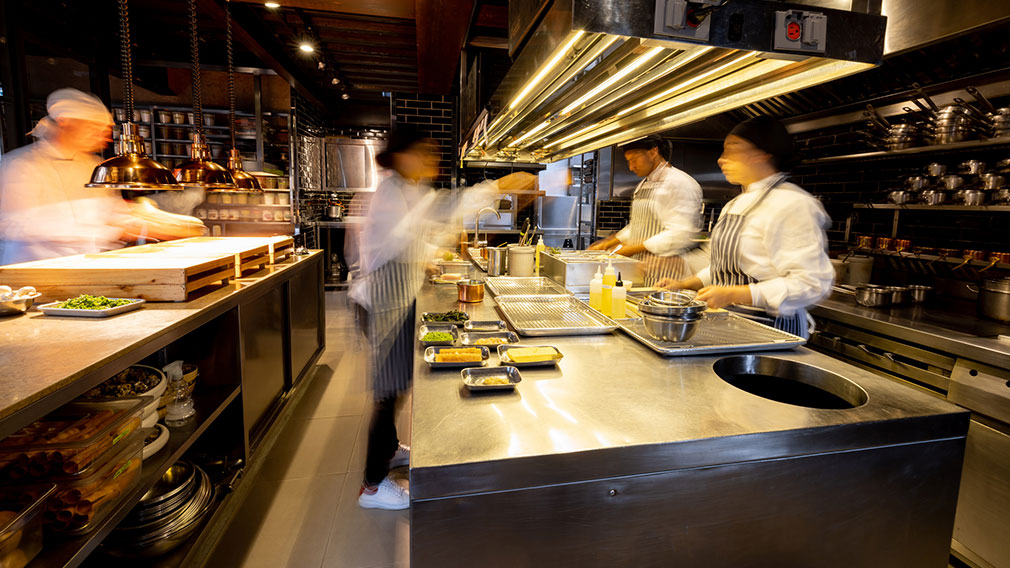The Aussie SMEs taking a bite out of Big Apple
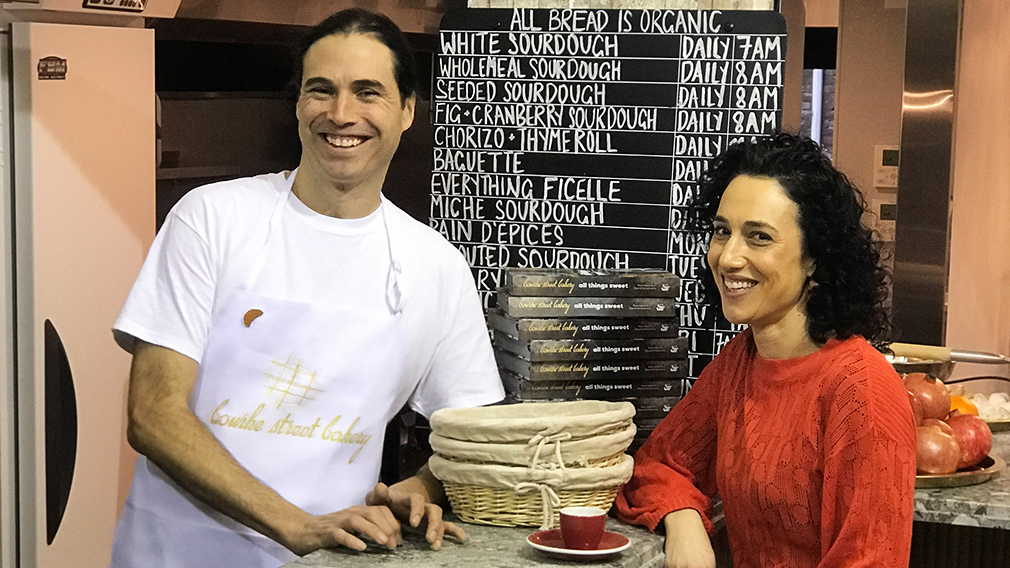
Paul Allam and wife Jessica in one of their bakeries. (Provided)
For Sydney natives Paul Allam and wife Jessica, the prospect of expanding their business in New York with kids in tow took on a whole different dimension to other ambitious Aussies.
But Allam, who co-founded Surry Hills icon Bourke Street Bakery more than a decade ago, says the chance to experience a new life in community-minded Brooklyn with their three-school aged kids, who now attend local schools in leafy Cobble Hill, was actually a key motivation.
“There was definitely a bit of a traveller in myself and Jess. We travelled a lot when we were young, and when you have children that becomes a bit harder,” he says over a cortado at a communal table in Bourke Street Bakery’s New York outpost in the up-and-coming NoMad district in Manhattan.
“So, we thought we would need to transplant here to experience a different culture, and we’d open up the business, and that obviously was Bourke Street.
“It was more of a lifestyle decision, than a business one. We don’t plan on taking over America.”
The bakery is the latest so-called “Australian cafe” to set up in Manhattan over the past decade, attracting locals and Aussie transplants devoted to the perfect flat white and sourdough toast in droves. Their names are often antipodean-inspired with the roll call including Little Collins and Banter, and the menus the antithesis of the traditional, greasy but quick American breakfast. Quinoa, charred broccolini, house-made yoghurt, and, of course, the now-ubiquitous avocado toast feature heavily, combined with drink menus that go well beyond the standard American filter coffee.
Perhaps the best-known is Bluestone Lane which was set up by former professional AFL player Nicholas Stone and was last year reportedly valued at around $US100 million after a $US19.5m capital raising.
In May, when Bourke Street Bakery opened its doors for buyers of its glammed-up version of the humble sausage roll, rich ginger crème brulee tart, and of course its famed sourdough loaves, there were lines around the block, and a near sell-out of its Instagrammable bakery products.
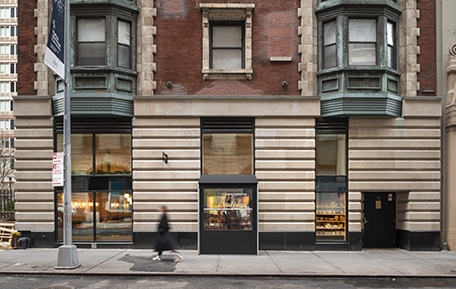
Bourke Street Bakery’s new outpost in New York. (Michael Vahrenwald, Esto)
The New York outpost marks the latest chapter for Allam following the company’s start in 2004 on an unassuming street corner in Sydney’s Surry Hills. Since then, another 10 bakeries have opened under the Bourke Street Bakery brand in Australia, plus he co-founded social enterprise The Bread & Butter Project – supported by the Westpac Foundation – in 2011. But New York marks his first overseas play rather than further expanding in Australia.
Ganesh Chandrasekkar, Westpac’s general manager for SME Banking, says more small businesses are expanding into new markets, noting the bank’s recent small business report which found 20 per cent of SMEs are mulling such a move.
“This reflects what I’m hearing from my customers, especially within service businesses, for example Whispli, a Whistleblowing platform business currently setting up in the US,” he says.
“Diversification and access to new markets is where the real opportunity lies because 25 million Australians aren’t enough to sustain ongoing growth for many small businesses.”
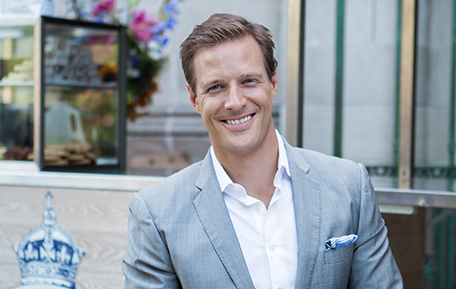
Bluestone’s Nick Stone at one of his cafes. (Provided)
For Allam, doing it all again in New York has included 14-hours days, getting back to basics and doing much of the baking himself in the theatrical, open-style kitchen.
His enjoyment is clearly visible – going back to the drawing board, creating new menu items and weaving culinary magic to tempt the taste buds of demanding New Yorkers. Current crowd favourite is the maple bacon danish which Allam says he first tried on the menu in Australia, but found “it didn’t work.” In New York, it’s flying out the bar-height glass display cases, as is the store’s Challah bread and smaller-style rye loaves. Local consumers were seemingly put off by the size of the traditional Australian loaves and Bourke Street responded by reducing the size.
Allam’s next culinary delight?
His take on the American campfire favourite – the s’more, which will be added to the menu soon. Bourke Street’s version will use its regular sweet tart base, filled with chocolate ganache and topped off with piped, singed marshmallow. Allam is also planning to “smash” pumpkin pie come Autumn.
“It feels very much like a start-up at the moment rather than an extension of Australia because I am running it as a separate entity, we have a Limited Liability Company (LLC), so there is not as much reliance on Bourke Street,” he says.
Official data on small businesses expanding overseas is fairly sparse, however Austrade last year said the US was the most cited market for anticipated generation of new international revenue among internationally active SMEs, with 20 per cent of survey respondents “planning to expand there”. One historical factor that has helped was a 2005 trade agreement with the United States which included the establishment of a flexible work visa and has seen an average of around 3000 Australians each year arrive to work in the US.
“There’s always the Aussie sitting there reminding themselves of home, but there’s an equally big crowd of locals who have embraced the culture,” says Josh Pugh who runs America Josh, a website which bills itself as a guide to helping Australians moving to New York.

Pedestrians in Times Square in New York. (Getty)
“I don’t think we would have seen the cafes take off nearly as effectively if it hadn’t been so widely embraced by the New York populous. It’s something different, but with more coming, it’s becoming more standard than I could have imagined.”
Like for Bourke Street Bakery, fellow Surry Hills business, hair salon and product company Prema, went a similar route and set up an LLC in New York in 2017. Its director Franscesco Ruggerino agrees that it was a straightforward process which enabled him to open his salon located on the hip Lower East Side.
“The administration part isn’t hard – you find a lawyer, you find an accountant to get everything in place legally. The real challenge is the cultural difference from market to market,” he says.
“The biggest challenge when you’re not a local is that you don’t know anyone, you don’t know what’s good. But for an entrepreneur it’s about pushing yourself, you have to mature and it has matured me as a business-owner.”
Ruggerino operates two locations in Sydney, one in New York and another in London. He also owns a hair product business called Anti, and says while his global business is still growing, he relishes the chance to work with street smart New Yorkers.
“It is the centre for progressive thought – New Yorkers are some of my favourite people in the world, the way they do things, they are incredibly savvy,” he says.
Allam agrees that there are key differences, many good, but says the brand has no desire to “change the culture”.
“Within the products that they love, the filtered coffee, the moreishness of the maple bacon Danish – we’re trying to add to it and create something a little better in terms of what we use in the ingredients,” he says.
In New York, Bourke Street is milling its own flour from wheat sourced from Maine, New Jersey and Canada and is keeping to a roster of seasonal produce sourced from Hudson Valley producers. For its famous sausage rolls, which are consistently sold out, Bourke Street still uses Australian lamb.
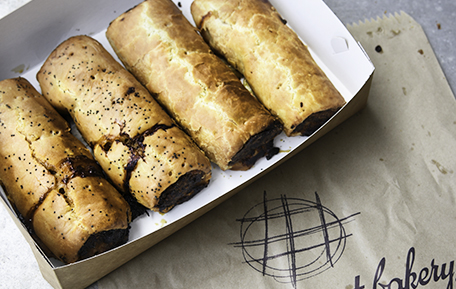
Bourke Street Bakery’s popular sausage rolls. (Michael Vahrenwald, Esto)
“We tried to get lamb here, we tasted so many lambs, but couldn’t get the right thing, so we’re importing it from Australia,” Allam says.
Cultural differences aside, it was all about getting the location right, says Allam, with the team settling on NoMad after checking out Brooklyn’s hipster enclaves of Williamsburg, Bed Stuy and Greenpoint due to its healthy mix of offices and residents.
“In terms of the market, and what we have to offer and the product we’re bringing there is so much more opportunity in terms of population. The culture is still transforming so there is still a lot of room to move,” he says.
“But we’re still very true to the product, and we still care deeply about what we serve, and for me it’s good to be back in the kitchen.”
The views expressed are those of the author and do not necessarily reflect those of the Westpac Group.

